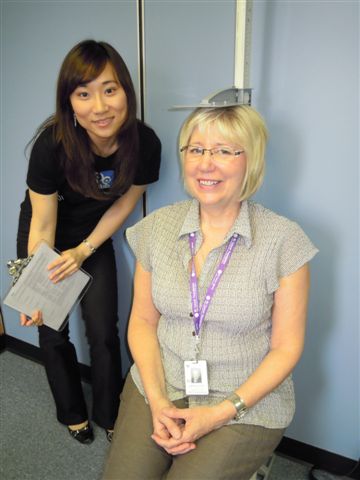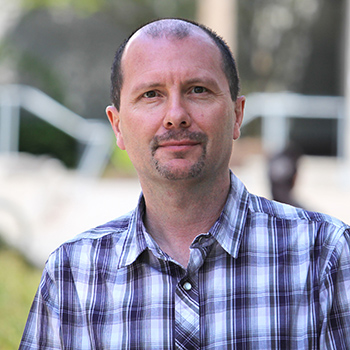
June Song of the BC Generations Project takes measurements of LaDonna Fehr at one of the temporary assessment centres used to recruit volunteers.
They have been measured and weighed. They have had their blood pressure taken and their grip strength assessed. They have even provided a sample of their blood and urine, and most crucially, have granted scientists access to their medical records – all in the name of science.
They are the more than 300,000 Canadians who volunteered for the Canadian Partnership for Tomorrow Project (CPTP), which is tracking the development of cancers and chronic diseases in the population over several decades to better understand the risk factors.
“You learn so much about people’s health when you track them over a long time,” said Trevor Dummer, Associate Professor in the School of Population and Public Health, and co-National Scientific Director of the CPTP. “We realized we needed to follow a big cohort here in Canada because we are a unique people with a unique geography.”
As described in the June 11 edition of CMAJ (Canadian Medical Association Journal), the CPTP is the national umbrella for several regional data-gathering efforts, including BC Generations, that will track people as they age.
BC Generations was initially led by UBC Clinical Professor Richard Gallagher, who then handed the baton to John Spinelli, a Professor in the School of Population and Public Health and Vice President of Population Oncology at BC Cancer. Between 2009 and 2012, BC Generations recruited 30,000 volunteers.
In the decades to come, scientists will look for correlations between the future health of the volunteers and the information they provided – not only during the examinations and sample-taking, but also in answering questions about their occupations, where they lived, and how much they exercised.
These types of longitudinal studies can provide powerful information that lead to improving health outcomes. One of the largest, the Nurses Health Study, first established in the U.S. in 1976 and now in its third iteration, revealed important evidence about risk factors associated with breast cancer. The Framingham Heart Study, centered on a suburb of Boston, provided insights into cardiovascular health.
The CPTP research platform was established so that any researcher can submit a proposal to access portions of the data. More than 80 scientific programs have already begun research with CPTP, and received independent funding from national and international funders.
Several studies have already appeared in journals such as Science and Nature Genetics, describing new genetic processes associated with disease development. Some scientists are using the data to understand why cancer rates vary across the country – for example, B.C. has much lower rates of certain types of cancers compared to Atlantic Canada.
Dr. Dummer and colleagues will examine metabolic syndrome, which includes a range of conditions like high blood pressure, Type 2 diabetes, glucose intolerance and cardiovascular disease, to understand how environmental factors, including air pollution and green space, interact with genetics to impact rates of metabolic disease nationally.
“In 20 to 30 years, some of the participants will have died, some will still be alive and some will have disease,” Dr. Dummer said. “But hopefully we’ll have an understanding of how environment and genetics contribute to disease so that we can learn how to slow and prevent diseases from developing.”
